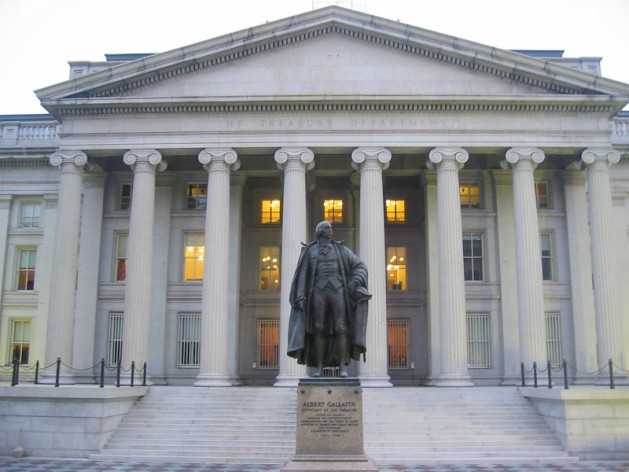
FBI headquarters. Photo (cc) 2008 by zaimoku_woodpile.
Previously published at GBH News.
It was a move reminiscent of the post-9/11 Patriot Act, which allowed federal investigators to spy on the reading habits of library and bookstore customers in the name of fighting terrorism.
Last week we learned that the FBI had subpoenaed USA Today in pursuit of Internet Protocol addresses and other data. The goal was to help the agency figure out the identities of people who had read a story last February about a Florida shootout in which two FBI agents were killed and three were wounded. The subpoena specifically cited a 35-minute time frame on the day that the shootings took place.
Fortunately, USA Today’s corporate owner, Gannett Co., the nation’s largest newspaper chain, took a principled stand and fought the subpoena. On Saturday, the FBI backed down. There’s already little enough privacy on the internet without having to worry about the possibility that government officials will be looking over our shoulders as we’re reading.
We are in the midst of a systematic assault on the media’s role in holding the powerful to account. And it’s long past time for our elected officials to do something about it by passing legislation rather than relying on assurances by President Joe Biden that he’s ending these abuses. After all, Biden’s assurances can be undone by the next president with the flick of a pen. We need something stronger and more stable.
Barely a month ago I wrote about the revelation that the Trump Justice Department had spied on three Washington Post reporters’ phone records. I observed that Trump’s actions were in line with a long string of presidential attacks on the media, from Richard Nixon to George W. Bush to Barack Obama.
Since then, the revelations have come at a dizzying pace. In addition to the USA Today subpoena, which strikes me as especially egregious since it targets readers rather than journalists, there have been at least two other noteworthy instances of abuse:
• In late May, CNN reported that the Trump administration had secretly obtained 2017 email and phone records of Barbara Starr, a longtime reporter for the network. The period in question was June 1 to July 31, 2017.
• In a particularly noxious abuse of the government’s power, The New York Times reported several days ago that the Justice Department had subpoenaed Google for the email records of four Times reporters — and that, though the inquiry had begun under former President Donald Trump, it continued under Biden. As recently as March, the Justice Department obtained a gag order prohibiting Google from informing the Times. That order was later amended so that a few top officials at the Times could be told, but not executive editor Dean Baquet.
“It is urgent that we hear from the attorney general about all three Trump-era records seizures, including the purported reasoning behind them and the rationale for not notifying the journalists in advance,” said Bruce Brown, executive director of the Reporters Committee for Freedom of the Press, in a statement released last week. “The goal must be to ensure that such abuses never occur again.”
Compounding the problem is the widely misunderstood belief that government officials are violating the First Amendment. For instance, on CNN’s “Reliable Sources” this past Sunday, Adam Goldman, one of the four Times reporters targeted in the Google probe, said, “The U.S. attorney’s office in D.C. has a history of trampling on the First Amendment, so that’s why I wasn’t surprised. They treat the media, they treat newspapers like drug gangs.”
In fact, over the past century the Supreme Court has interpreted the First Amendment in such a way that the protections for news gathering are exceedingly weak.
Protections for publication and broadcast are strong, which is why the press has been able to report on secret stolen documents — from the Pentagon Papers to the Snowden files — with few concerns about facing prosecution.
But the court has ruled that journalists have no constitutional right to protect their anonymous sources. And with regard to the current string of spying revelations, the court has held repeatedly that journalists enjoy no special rights that would not be available to ordinary citizens.
President Biden recently pledged to end the practice of seizing reporters’ records, saying the practice is “simply, simply wrong.” Some observers questioned whether he actually meant it, since he’d be breaking not just with Trump’s abuses but with longstanding practice. That, in turn, led press secretary Jen Psaki to assure journalists that Biden planned to follow through on his pledge.
But what a president does, a future president can undo. To guarantee that the press will be able to perform its watchdog role, we need a federal shield law so that reporters won’t be compelled to reveal their confidential sources. Such protections — either by law or by court decision — are already in place in 49 states, with the sole exception being Wyoming.
We also need legislation that prevents the government from secretly spying on journalists’ online activities — and on readers’ activities as well.
No doubt opponents will insist that the government needs to be able to spy in order to keep us safe. But the Post, CNN and Times cases appear to involve the Trump administration’s politically motivated attempts to learn more about the origins of the Russia probe, including the activities of former FBI Director James Comey. The USA Today case did involve a much more serious matter. But after dropping its demands, the FBI told the BBC that “intervening investigative developments” made the information unnecessary.
Which is nearly always the case. Rarely does the government’s desire to interfere with the press’ role involve a situation that’s literally a matter of life or death. And the law can accommodate those rare instances.
In general, though, the government should go about its business without compromising the independence or freedom of the press.





